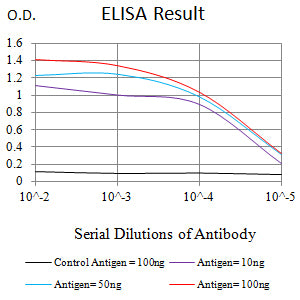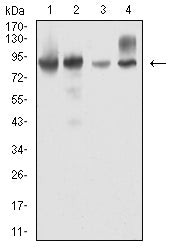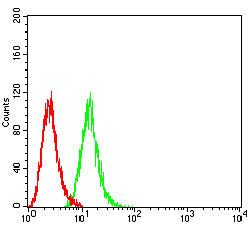


| WB | 1/500 - 1/2000 | Human,Mouse,Rat |
| IF | 咨询技术 | Human,Mouse,Rat |
| IHC | 咨询技术 | Human,Mouse,Rat |
| ICC | 技术咨询 | Human,Mouse,Rat |
| FCM | 1/200-1/400 | Human,Mouse,Rat |
| Elisa | 1/10000 | Human,Mouse,Rat |
| Aliases | R1; RR1; RIR1 |
| Entrez GeneID | 6240 |
| clone | 5F12E6 |
| WB Predicted band size | 90kDa |
| Host/Isotype | Mouse IgG2a |
| Antibody Type | Primary antibody |
| Storage | Store at 4°C short term. Aliquot and store at -20°C long term. Avoid freeze/thaw cycles. |
| Species Reactivity | Human |
| Immunogen | Purified recombinant fragment of human RRM1 (AA: 541-792) expressed in E. Coli. |
| Formulation | Purified antibody in PBS with 0.05% sodium azide |
+ +
以下是关于RRM1抗体的3篇文献摘要概述(基于公开信息整理,非实时数据):
---
1. **文献名称**: *RRM1 modulates sensitivity to gemcitabine in human cancer cell lines*
**作者**: Zheng et al.
**摘要**: 研究通过免疫印迹(Western blot)使用RRM1抗体,发现RRM1蛋白表达水平与肿瘤细胞对化疗药物吉西他滨(gemcitabine)的敏感性呈负相关,提示RRM1可作为预测化疗反应的潜在标志物。
---
2. **文献名称**: *RRM1 and PTEN as prognostic biomarkers in non-small cell lung cancer*
**作者**: Bepler et al.
**摘要**: 利用RRM1抗体进行免疫组化分析,发现非小细胞肺癌(NSCLC)组织中RRM1的高表达与患者生存期延长相关,且与PTEN基因表达联合分析可优化预后评估模型。
---
3. **文献名称**: *Development of a monoclonal antibody specific for RRM1 and its clinical applications*
**作者**: Jordheim et al.
**摘要**: 报道了一种新型抗人RRM1单克隆抗体的开发,验证其特异性后应用于结直肠癌组织检测,结果显示RRM1表达与5-FU化疗耐药性相关,为个体化治疗提供依据。
---
**注**:如需具体文献,建议通过PubMed或Web of Science以“RRM1 antibody”、“RRM1 biomarker”等关键词检索近年研究。
The Ribonucleotide Reductase Catalytic Subunit M1 (RRM1) is a critical enzyme involved in DNA synthesis and repair, catalyzing the conversion of ribonucleotides to deoxyribonucleotides—a rate-limiting step in nucleotide metabolism. As the regulatory subunit of ribonucleotide reductase, RRM1 controls substrate specificity and overall enzyme activity, playing a pivotal role in maintaining genomic stability. Dysregulation of RRM1 has been implicated in cancer progression, with overexpression observed in various malignancies, including lung, breast, and ovarian cancers. Its expression levels are associated with chemoresistance and patient prognosis, particularly in therapies involving gemcitabine or platinum-based agents.
RRM1 antibodies are essential tools for studying these biological and clinical relationships. They enable the detection and quantification of RRM1 protein expression in tissues or cell lines through techniques like Western blot, immunohistochemistry (IHC), and immunofluorescence. Researchers use these antibodies to investigate RRM1's role in cell cycle regulation, DNA damage response, and its interplay with oncogenic signaling pathways. Clinically, RRM1 antibody-based assays help stratify patients for personalized chemotherapy, as low RRM1 expression often correlates with better response to certain antimetabolite drugs. Commercial RRM1 antibodies are typically developed using immunogenic peptide sequences specific to human RRM1. with validation across multiple applications to ensure specificity. Ongoing research continues to explore RRM1 as both a biomarker and potential therapeutic target in precision oncology.
×